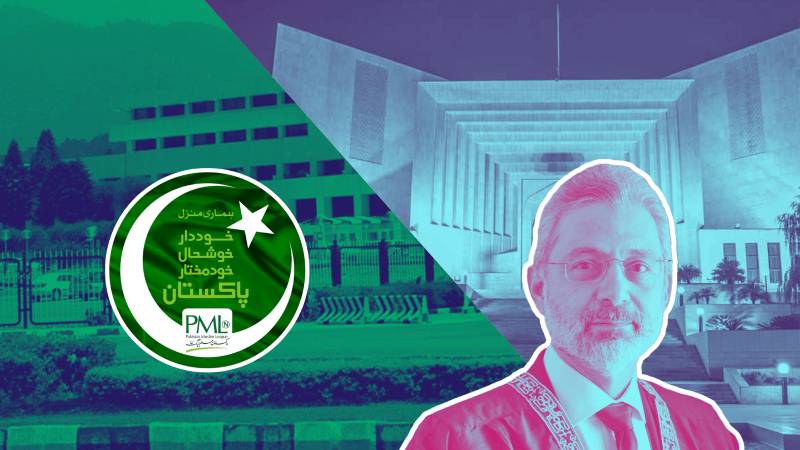
Amidst speculation regarding the government's rumoured plans to introduce a constitutional amendment, a debate has erupted on whether the government could muster the required two-thirds majority in both houses, especially in the National Assembly.
Political pundits claim that in the aftermath of the verdict issued by the Supreme Court in the reserved seats case, the government has set their eyes on independent Members of the National Assembly (MNAs), predicting that such MNAs could play a pivotal role in any likely constitutional amendment to introduce a 'judicial package' that is expected to extend the tenure of judges and the modus operandi for selecting the chief justice as well as regulating the use of Article 184(3).
The matter of reserved seats still hangs in the balance because judges of the top court remain unavailable to hear review petitions filed by other political parties and the Election Commission of Pakistan (ECP) owing to the ongoing summer vacations. The ECP has thus far notified 39 MNAs—previously declared as independents—as PTI lawmakers because they had mentioned their affiliation with the party in their nomination papers in line with the top court's orders.
However, the ECP maintains that the remaining 41 independent MNAs, who had neither mentioned the PTI in their nomination papers, nor had they disclosed their affiliation with the party, or had failed to submit any party ticket, remain independent candidates.
Although the majority judgment issued by eight judges of the top court out of the 13-member full court panel provided the mechanism for resolving the situation, the ECP maintains that the PTI currently lacks a legal party structure to complete the procedure necessary to declare these independent candidates as PTI members. Hence, it had filed an application in the top court seeking clarity from eight judges regarding their judgment.
Further, review petitions against the majority decision filed by the Pakistan Muslim League Nawaz (PML-N) and the Pakistan Peoples Party (PPP) remain pending before the top court as many judges are currently on vacation. Further, the top court has already expressed that these review applications cannot be entertained until the detailed reasons of the majority judgment are issued.
The top court's summer vacations are expected to officially end on September 8, after which the detailed reasons of the majority judgement can be released.
However, legal experts believe that in such a scenario, the 41 MNAs would be recognised as independent candidates, and the defection clause is not applicable to such MNAs when the National Assembly meets in the new week.
In the National Assembly, the ruling PML-N fields 144 members. On the other hand, the PPP has 68 MNAs, putting the coalition at a total of 212 MNAs. If the Jamiat-e-Ulma-e Islam Fazl (JUI-F) joins the ruling party with its eight MNAs, then the ruling coalition will only need four independent MNAs to bring their tally up to 224 votes, the requisite number to attain two-thirds majority in the lower house.
"Now we understand that the eight judges had indirectly paved the way for the government [to successfully hold the vote]. Look at PTI's track record, whether it was the March 2018 Senate elections or the April 2022 no-confidence vote, their MNAs voted against their party policy," claimed Khalid Hussain Taj, a lawyer and a PML-N activist.
Taj further claimed that after the top court's July 12 judgment declared these 41 MNAs as independent, hence Article 63-A - which binds them to vote per party lines save in certain scenarios - would not apply to them.
"You know, independent members (of national assembly) in our country support the government in legislative matters," Taj stated suggestively.
Article 63-A of the Constitution relates to the defection or de-seating of members of Parliament or provincial assemblies. Taj further said that constitutionally, the defection clause shall not apply to all returned candidates who had independently participated in the February 8 general elections, and have not joined any political party currently present in the assemblies through declarations submitted to the ECP after the polls, as per the process laid down under Article 51 (6) of the Constitution.
Advocate Khokhar explained that, given the July 12 majority judgment of the top court, all the returned independent candidates who had joined the Sunni Ittehad Council (SIC) after the general elections under Article 51(6) of the Constitution would be treated as independent candidates, except the 39 MNAs whose notifications were issued by the ECP after the Supreme Court's short judgment. Thus, the remaining 41 independent candidates remain independent until the top court clarifies its order or the ECP issues a notification regarding their affiliation with any party.
"They shall remain independent candidates in the proceedings of National Assembly, and if any of them participates and votes for the constitutional amendment, the defection clause under Article 63-A of the Constitution shall not be applied to them, being to their such action in the National Assembly proceedings for the constitutional amendment," said Advocate Khokhar.
Judicial package
Sources claim that a section within the ruling PML-N believes that like-minded judges of former chief justice of Pakistan Umar Ata Bandial must be stopped from becoming chief justices in the future. To do this, relevant legislation needs to be introduced to extend the tenure of the incumbent chief justice. They believe such a move can help boost public confidence and trust in the judiciary while safeguarding the top-most tier of the judiciary from manipulation by other powerful state organs.
At the moment, Articles 176, 177, and 179 of the Constitution—which determines the composition of the Supreme Court, the appointment process, and retirement age—stipulate that judges of the superior courts will retire by the age of 65. At the same time, there exists no provision in the Constitution which allows to extend the tenure of either the chief justice or a judge of the Supreme Court or the high courts.

